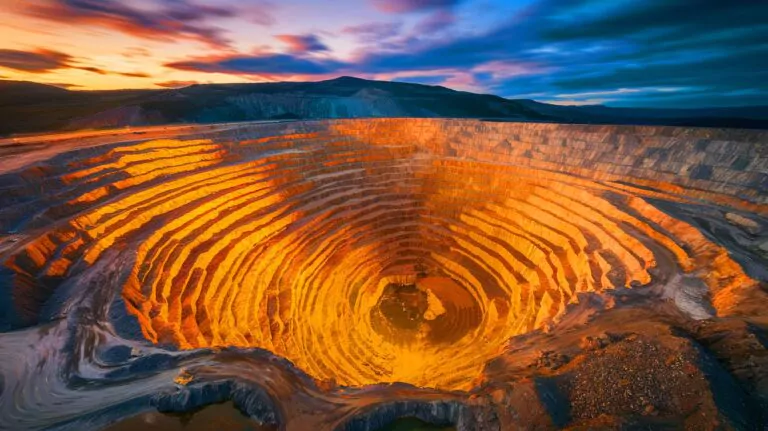| IN A NUTSHELL |
|
Recently, the discovery of a massive gold deposit in China has captured global attention, with far-reaching implications for the world’s mining industry. Touted as one of the largest finds in history, this treasure trove has stirred curiosity not only because of its sheer size but also due to its potential economic and strategic impacts. Nestled in a region already known for its mineral wealth, this discovery is poised to redefine the global gold market and may influence environmental policies and technological innovations in mining practices.
Why This ‘Supergiant’ Deposit Is Making Waves
The Chinese gold deposit contains approximately 1,000 tons of high-quality ore. If these numbers hold, it will surpass renowned sites like South Africa’s South Deep mine, which holds around 900 tons. The term “supergiant” is used to describe deposits that contain billions of ounces of resources. Estimated to be worth about $83 billion, this find could have a profound impact on the world economy.
Geologically, the site is notable, with 40 gold veins detected up to two miles underground. Three-dimensional models suggest even more wealth could be hidden at these depths. Each metric ton of ore is believed to contain up to 138 grams of gold, underlining the deposit’s exceptional quality. The implications of this discovery extend beyond economics, potentially influencing geopolitical dynamics and mining technologies.
Scientists create heat-resistant super corals that could save entire marine ecosystems from collapse
Price Surge and Environmental Challenges: What Lies Ahead?
This discovery has already jolted global gold markets, causing prices to spike and increasing demand worldwide. With over 2,000 tons of gold reserves in 2024, China could strengthen its leading position in the global mining industry. Currently, Chinese miners account for about 10% of global gold production.
Extracting this gold, however, poses significant challenges. Gold being a finite resource, with around 53,000 metric tons extracted globally to date, new deposits often require massive investments to access. Moreover, stringent environmental regulations and a growing need for sustainable mining practices add layers of complexity. This scenario presents a conundrum: how to balance economic gains with environmental stewardship?
New Scientific Theories and Technological Innovations on the Horizon
The origin and formation of gold deposits remain a captivating mystery for scientists. Quartz veins appear to play a crucial role in the process, while some theories suggest seismic activity as a factor that concentrates gold in specific areas. Chris Voisey, a geologist at Monash University, highlights that although this theory is popular, it does not fully explain how large gold nuggets form.
Alongside traditional methods, technological advances are opening new possibilities. Recently, a two-dimensional form of gold known as “goldene,” just one atom thick, was developed. This innovation could lead to futuristic applications, such as in semiconductors. Shun Kashiwaya from Linköping University notes, “When you create a material this thin, something extraordinary happens, much like with graphene.”
Exploring Further: Implications and Future Prospects
The implications of this discovery are vast, affecting not just the mining sector but also economic policies and scientific research. As China potentially solidifies its dominance in gold production, other nations may need to reassess their strategies and resource management. The environmental challenges posed by mining such a vast deposit also demand attention and innovative solutions.
This find may spur a new wave of scientific inquiry and technological development, as researchers seek to understand and harness the processes that lead to such rich deposits. The global community will be watching closely to see how these developments unfold and what they mean for the future of mining and resource management.
As the world grapples with the opportunities and challenges presented by this remarkable discovery, one question remains: How will nations balance economic ambitions with environmental and ethical responsibilities in the age of supergiant resources?
Did you like it? 4.6/5 (28)








Wow, this is huge! 🌟 How will this affect gold prices globally?
Dumpf pork Sharia farts explosives as usual called pigsslll
Is it true? Sounds like another exaggerated claim from Trump. 🤔
Thank you for the detailed analysis. This discovery could really shake things up.
China’s GDP is over $17 trillion and every year 2500-3000 metric tons of PROCESSED gold (there’s less than 10 grams of processed gold per metric ton of ore) is mined. So with those numbers in mind, is this article being serious?
Can China manage the environmental impact of such a large mining operation?
Biggest ever? I doubt it. Let’s see some proof first.
How reliable is the $83 billion estimate?
Great article! Really informative. 😊
Does this mean gold will become cheaper or more expensive?
Hope this doesn’t result in more political tension. 😬
China’s GDP is over $17 trillion and every year 2500-3000 metric tons of PROCESSED gold (there’s less than 10 grams of processed gold per metric ton of ore) is mined. So with those numbers in mind, is this article being serious?
Is this another one of Trump’s “believe me” moments?
Interesting timing for this discovery. Could there be more to it politically?
How will this affect the South African gold mining industry?
I’m skeptical. Will wait for more reports before believing it.
This is a game changer for sure! 💰
What about the local communities near the mining site?
The environmental impact worries me.
Can someone explain how this affects the average person?
Is this discovery linked to any new technologies in mining?
Thanks for the update! The global economy just got more interesting. 🌍
Trump always says “biggest ever”. Is it really? 🤷♂️
How much gold does the US have in comparison?
Could this lead to a gold rush in China?
Great insights, but I’m concerned about the environmental cost.
Is this the start of a new era in mining technology?
Can this discovery influence stock markets? 📈
This is why I don’t trust politicians. Always exaggerating.
How does this compare to other major gold finds?
Biggest ever? I’ll believe it when I see it.
Is anyone else worried about the geopolitical tensions this might cause?
Hope this leads to sustainable mining practices.
What are the implications for other countries with gold reserves?
Interesting read! But I’m curious about the long-term effects. 🤓
Could this discovery be overhyped?
How will this affect small gold mining companies?
I’m excited to see how this develops! 🏆
Is there a risk of environmental disasters with such large-scale mining?
Why is Trump involved in this discovery at all?
Is this discovery fully verified by independent sources?
This could redefine the gold market. Incredible! 💡
This has nothing to do with Trump. It was a Chinese discovery on Chinese soil and the profits will almost certainly all be Chinese. I’ve seen no evidence of Trump’s involvement or even comments from him on it.
Is this what we call journalism? Trump never made any comments on this and it has nothing to do with him
Some of the information in the article makes little sense. For instance, the discovery of a massive amount of gold should cause the value of gold to dive rather than spike.